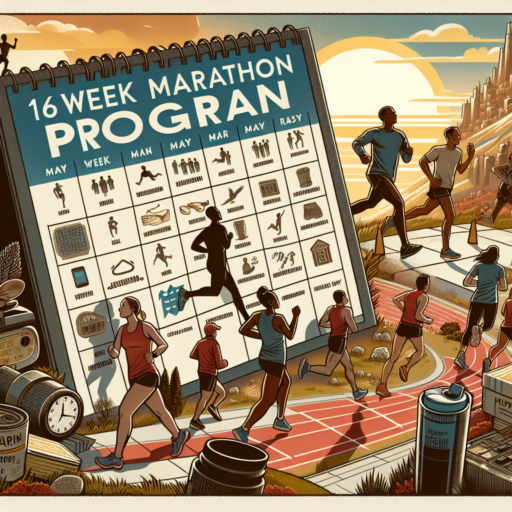Introduction to the 16 Week Marathon Program
Welcome to the beginning of an incredible journey with our 16 Week Marathon Program. This program is meticulously crafted for both beginners and seasoned runners aiming to conquer the marathon distance. With a blend of science and practical experience, the program is designed to gradually build your endurance, strength, and confidence, ensuring that you are marathon-ready by the end of these transformative 16 weeks.
Embarking on this journey, you will find that the program is not just about increasing your miles but also about incorporating essential elements that contribute to a successful marathon experience. These include nutritional advice, injury prevention techniques, and mental preparation strategies. Each week, you will be guided through a variety of workouts that are structured to progressively challenge your body and mind, preparing you for the physical and mental demands of marathon running.
Understanding the commitment required for a marathon, our 16 Week Marathon Program is designed with flexibility in mind. It accommodates varying levels of runner’s abilities and schedules, making it feasible for anyone passionate about reaching the marathon finish line. As you progress through the weeks, you will not only build physical stamina but also develop a deeper understanding of running as a sport and what it takes to achieve your long-distance goals.
Week-by-Week Breakdown of the 16 Week Marathon Training Schedule
Embarking on a 16-week marathon training schedule is an exciting journey that requires dedication, perseverance, and a well-structured plan. This week-by-week breakdown is tailored to gradually increase your endurance, improve your speed, and prepare your body and mind for the demands of running 26.2 miles. By understanding what to expect each step of the way, runners can optimize their training efforts and set themselves up for a successful marathon experience.
Initial Weeks: Building the Foundation
The first four weeks are crucial for building a solid aerobic base. During this phase, focus on slowly increasing the mileage of your long runs at a comfortable, conversational pace. Incorporating rest or easy days after challenging workouts is essential to allow your body to recover and adapt. Strength training, emphasizing core stability and leg strength, should also be included to support your running mechanics and reduce the risk of injury.
Middle Phase: Enhancing Endurance and Speed
Weeks 5 through 12 are about progressively challenging yourself by incorporating more specific workouts, such as tempo runs, interval training, and hill repeats. These sessions are designed to enhance your aerobic capacity, speed, and running economy. Long runs become increasingly important, reaching up to 50-60% of your total weekly mileage. This middle phase is pivotal in developing the endurance needed for the marathon, while still allowing enough time for recovery and growth.
Tapering Period: Preparing for Race Day
The final phase of your training, weeks 13 to 16, involves a gradual reduction in training volume, known as tapering. This period allows your body to recover from the accumulated fatigue and prepare for optimal performance on race day. While reducing mileage, maintain the intensity of your workouts to keep your legs feeling sharp. Focus on quality rest, nutrition, and mental preparation during these last few weeks to ensure you are fully prepared to tackle the marathon with confidence and strength.
Nutrition Tips for Your 16 Week Marathon Preparation
Embarking on a 16-week marathon preparation journey is an exhilarating challenge that requires not just rigorous training but also a carefully planned nutrition strategy. Understanding how to fuel your body is crucial for maximizing performance and ensuring you cross the finish line strong. Here we delve into essential nutrition tips to guide you through your marathon preparation.
Optimizing Your Carbohydrate Intake
Carbohydrates are your body’s primary source of energy during high-endurance activities like marathon running. As you progress through your 16-week preparation, gradually increase your carbohydrate intake to enhance your energy stores. Focus on incorporating complex carbohydrates, such as whole grains, vegetables, and fruits, into your diet. These foods not only provide sustained energy but are also packed with essential nutrients and fiber.
Balancing Proteins and Fats
While carbohydrates are key, a balanced diet that includes adequate protein and healthy fats is vital for recovery and energy. Protein is essential for muscle repair and growth, especially after long runs. Include lean sources of protein such as chicken, fish, tofu, and legumes in your meals. Don’t overlook the importance of fats — particularly omega-3 fatty acids found in fish, nuts, and seeds — which can reduce inflammation and improve heart health.
Always remember to listen to your body’s cues and adjust your diet accordingly as you navigate through your marathon prep. Proper nutrition is not just about eating the right things; it’s also about timing and balance to support your training regime. Focus on these tips to fuel your body efficiently for the rigorous journey ahead.
Importance of Rest and Recovery in Your Marathon Training
When embarking on the rigorous journey of marathon training, the focus often lies heavily on pushing your limits and increasing mileage. However, overlooking the importance of rest and recovery can lead to diminishing returns and potentially, injury. It’s vital to understand that recovery is when your body repairs itself, becoming stronger and more adept at handling long distances.
Why Recovery Matters
In the realm of marathon training, rest days are not a sign of weakness but a crucial component of improvement. They allow your muscles to heal from the microtears that occur during intense or prolonged exercise. This healing process is essential for building strength and endurance. Furthermore, rest helps to prevent burnout and mental fatigue, ensuring that your motivation and enjoyment of the training process remain high.
Beyond physical rest, recovery encompasses active recovery, nutrition, and sleep. Active recovery, such as light jogging or yoga, can facilitate blood flow, aiding in the removal of lactic acid and speeding up the muscle recovery process. Proper nutrition provides the building blocks for muscle repair, while quality sleep enhances overall recovery through hormonal regulation and mental refreshment.
Customizing Your 16 Week Marathon Program for Success
Embarking on a 16-week marathon training program is an exciting journey towards achieving your running goals. However, the key to maximizing the benefits of any training plan lies in its customization. Tailoring your marathon program to fit your specific needs, abilities, and lifestyle can significantly enhance your chances of success. Understanding how to adjust the intensity, volume, and type of workouts is crucial.
Assess Your Current Fitness Level
Before diving into the specifics of customizing your training plan, it’s imperative to assess your current fitness level. This assessment will serve as the foundation for making informed adjustments. Consider factors such as your running history, recent performances, and any potential physical limitations. A realistic appraisal of your starting point will enable you to set achievable goals and adjust the plan to safely increase your stamina and speed.
Incorporate Rest and Recovery
Rest and recovery are vital components of any successful marathon training program. Customization involves not just the running days, but also integrating adequate rest days and recovery techniques. Listen to your body and adjust your training schedule to include rest days before you feel completely drained. This proactive approach to recovery can prevent overtraining, reduce injury risk, and ultimately lead to better performance on race day.
Mid-Program Check-In: Evaluating Your Progress
Reaching the midpoint of any program is a significant milestone that merits a thorough evaluation of your progress. It’s the perfect time to pause, reflect, and align your efforts with your initial goals. This Mid-Program Check-In is not merely a ritualistic pause but a crucial exercise to ensure you’re on the right track towards achieving your objectives.
The process of evaluating your progress at this stage involves a comprehensive analysis of both the quantitative and qualitative aspects of your performance. It’s essential to assess the milestones you’ve reached, the knowledge you’ve gained, and the skills you’ve developed. However, it’s equally important to consider your level of engagement, the challenges you’ve encountered, and how you’ve adapted to overcome them. This holistic approach guarantees not just a diagnosis of where you are but also provides insights into how you can enhance your trajectory in the remainder of the program.
Moreover, your Mid-Program Check-In can act as a catalyst for motivation. Recognizing the progress you’ve made can reignite your enthusiasm and commitment to your goals. It’s a moment to celebrate your achievements, no matter how small they may seem, and to recalibrate your strategies if necessary. Adjusting your methods or goals at this stage isn’t a sign of failure but a flexible approach towards ultimate success. Engaging in this self-evaluation ensures that you remain rooted in your objectives while staying adaptable to the learning curve ahead.
Common Challenges and How to Overcome Them During Marathon Training
Training for a marathon is a rewarding journey that comes with its unique set of challenges. Whether you’re a first-timer or a seasoned runner, understanding these hurdles and knowing how to navigate them is crucial for a successful training program.
Dealing with Injuries and Overuse
Injuries are perhaps the most common setback during marathon training. From shin splints to knee issues, the risk of overuse injuries lurks at every corner. The key to overcoming these challenges lies in listening to your body and incorporating proper recovery strategies. Emphasizing rest days, engaging in cross-training activities, and seeking professional advice at the first sign of pain can prevent minor issues from becoming major setbacks.
Navigating Motivation Lulls
It’s natural for your motivation to ebb and flow throughout the training process. To combat these dips, setting small, achievable goals along the way to your larger marathon goal can help maintain focus and momentum. Additionally, joining a running group or finding a training partner can provide the social support and accountability needed to push through the tougher days.
Adjusting to Weather Conditions
Weather can greatly impact your training schedule and performance. Extreme heat, cold, or humidity not only affects how your body feels but also how it performs. Adapting your training plan according to weather conditions is essential. This might mean switching to indoor workouts, running during cooler times of the day, or investing in the right gear to protect against the elements. Understanding that some training days might not go as planned due to weather and being flexible in your approach will help keep your marathon training on track.
Tapering Before the Marathon: The Final 3 Weeks
The final three weeks leading up to a marathon represent a critical period for every runner, a phase often termed as ‘tapering’. Tapering involves gradually reducing the volume of your training to allow your body to recover from the preceding months of high-intensity workouts and prepare for the main event. This period is pivotal to optimize performance, minimize injury, and ensure you arrive at the starting line in the best shape possible.
During this tapering phase, emphasis should be placed on maintaining your running fluidity while reducing mileage. It’s not the time for trying anything new or pushing for personal records. Instead, focus on maintaining a balance between resting and light running to preserve your fitness level. Nutrition and hydration also play a key role during these weeks. Adequate intake of carbohydrates, proteins, and fluids is essential to replenish energy stores and repair tissues.
Key Elements of Tapering
- Reduced Mileage: Gradually decrease your running volume to 40-60% of your peak pre-taper mileage.
- Maintain Intensity: Keep up with your running intensity and pace to retain neuromuscular adaptation without overtaxing your body.
- Focus on Nutrition: Prioritize a balanced diet rich in essential nutrients to aid in recovery and energy restoration.
- Optimize Rest: Ensure adequate sleep and consider incorporating light stretching or yoga to promote muscle recovery.
Adhering to these principles during the final countdown to race day can significantly impact your marathon experience. It allows not just for physical readiness but also mental preparation, setting the stage for a successful and enjoyable run.
Race Day Tips: Maximizing Your Performance
Optimizing your performance on race day comes down to strategic preparation and smart tactics. Whether you’re a seasoned runner or tackling your first marathon, understanding how to maximize your potential is pivotal. Below, we reveal key strategies designed to elevate your racing experience and improve your overall results.
Understanding Pre-Race Nutrition
Proper fueling before a race is crucial. Start by consuming a carbohydrate-rich meal the night before. This can include pasta, rice, or sweet potatoes. On the morning of the race, opt for a light breakfast such as oatmeal or a banana with peanut butter approximately 2-3 hours before the start. This ensures your energy levels are optimized without leaving you feeling sluggish.
Mastering The Art of Pacing
Effective pacing is the cornerstone of a successful race. Begin by setting a realistic target based on your training and previous race times. Always resist the urge to start too fast, which can lead to early fatigue. Instead, aim to maintain a steady pace throughout, possibly saving some energy for a strong finish. Utilizing a running watch or app to track your pace can greatly assist in maintaining your target speed.
Emphasizing Recovery and Post-Race Care
While the race itself is an achievement, the importance of post-race recovery cannot be overstated. Start your recovery with a cool-down walk and gentle stretching to prevent stiffness. Hydration is key, so drink plenty of water or electrolyte-replacing beverages. Also, consider a post-race meal with a balance of carbohydrates, protein, and fat to aid in muscle recovery.
What to Do After Completing Your Marathon: Post-Race Recovery and Next Steps
Completing a marathon is a monumental achievement that requires months of preparation and hard training. However, the journey doesn’t end at the finish line. Proper post-race recovery is crucial to replenish your strength, prevent injuries, and set the stage for your next physical challenge. In this guide, we’ll cover essential steps to consider after crossing the finish line to ensure a smooth transition from the high of your marathon accomplishment to your regular training routine.
Initiate Recovery with Proper Nutrition and Hydration
After completing a marathon, your body needs immediate attention to begin the healing process. Rehydrating is your first priority; aim to replenish fluids lost through sweat with water or isotonic sports drinks that can also restore electrolyte balance. Consuming a balanced meal rich in carbohydrates and protein within two hours after finishing can significantly aid muscle recovery. Foods like banana, yogurt, or a lean turkey sandwich are excellent choices to kickstart your post-marathon recovery.
Ease Muscle Soreness with Rest and Gentle Movement
Rest is paramount after a grueling 26.2-mile race, but complete inactivity can exacerbate muscle stiffness and soreness. Incorporate gentle activities such as walking or yoga in the days following the marathon to promote blood circulation. This can help speed up the repair of micro-damages in your muscles. Additionally, consider taking a warm bath or visiting a professional for a massage. Utilizing foam rollers can also be beneficial in loosening tight muscles and improving mobility.
Remember, your post-marathon recovery is as significant as the race itself. Listen to your body, prioritize rest, and nutrition, and gradually reintroduce training to ensure a healthy return to your running regimen. By taking these steps, you’ll be well-prepared to tackle your next running challenge with vigor and confidence.








